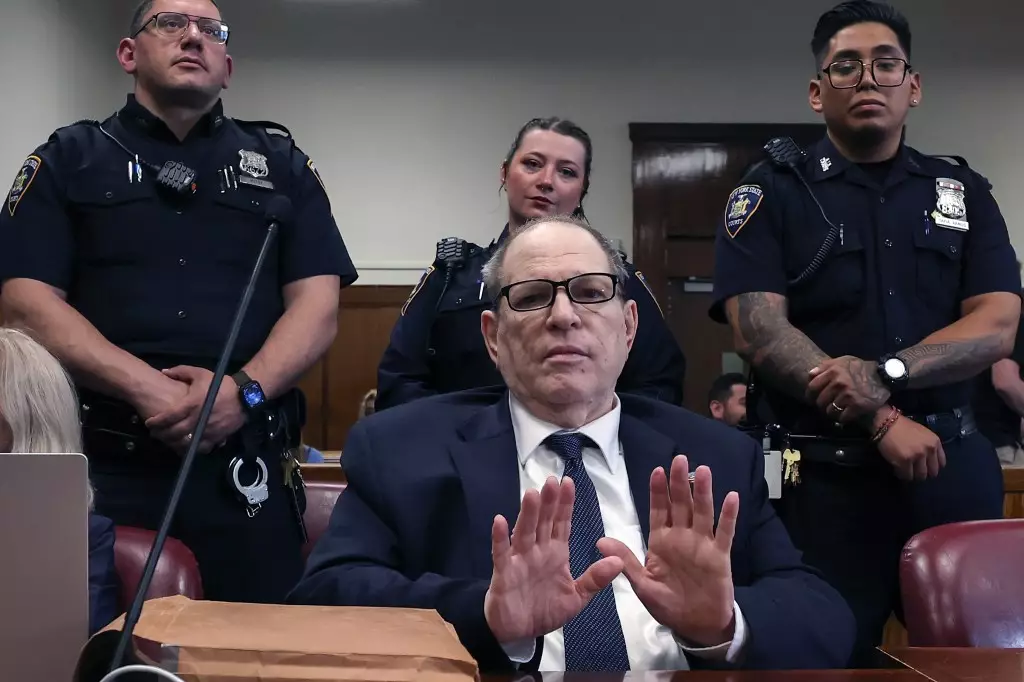Harvey Weinstein’s ongoing legal saga has become a tragicomic spectacle, revealing the inseparable link between power and the law, and raising questions about morality in a post-#MeToo world. At the age of 73, Weinstein’s decision not to testify in his New York rape retrial is staggering. What should be a pivotal moment in his case has shifted into a complex chess game, with his legal team opting for silence over the potential chaos of cross-examination. The rhetoric from his spokesperson, Juda Engelmayer, diminishes the notion of a straightforward defense. Instead, it casts a shadow over the entire proceedings as it hints at a strategy driven not by innocence, but by a deeply ingrained instinct for self-preservation.
In a system often marred by the overwhelming influences of wealth and privilege, Weinstein appears to be wielding his resources to play a meticulous game of chess rather than straightforward legal combat. This evasive tactic reveals the courtroom as just another venue for the manipulation of narratives, where the truth is obscured by legal jargon and media spin. In choosing not to testify, Weinstein’s team has signaled that a façade of humility might be preferable to risking the exposure that comes with a witness stand.
The Alchemy of Public Perception
While Weinstein refrains from taking an active role in his defense, he has not shied away from the larger narrative being constructed around his case. His interview with controversial figure Candace Owens serves as a disturbing reminder that the lines between victimhood and perpetration can be flamboyantly crossed in the public eye. His declaration of innocence amidst a sea of accusations serves only to muddle the waters further, creating an environment ripe for speculation and division. This calculated move suggests a shift from the legal arena to the realm of public relations — a space where truth is often a casualty of personal branding.
Weinstein’s insistence on being a victim of wrongful accusations is an egregious attempt to conflate legality with morality. His claim that “justice has to know the difference between what is immoral and what is illegal” is as paradoxical as it is manipulative. In a world where social movements and activism shape moral discourse, such statements are provocative and speak to his desperation in clinging to an innocence that many have long stripped away.
Judicial Intrigue and Political Undercurrents
The backdrop of Weinstein’s legal battles is colored by political maneuvering that would make any political strategist proud. The replacement of the judge in his retrial is perhaps the most glaring example of how interconnected the legal system can be with the currents of political influence. This sort of ‘sharp-elbowed politics’ that smoothly reconfigures the terms of discourse shows just how malleable the judicial system can be when financial weight and public notoriety press upon it.
The added criminal sexual charge only thickens the plot, pointing to a justice system that seems reluctant to close the door on a case that has haunted public consciousness since its inception. Each twist feels meticulously crafted, echoing the strategic decisions that permeate Weinstein’s legal battles, showcasing an environment where justice appears negotiable rather than absolute.
Accountability and the Echoes of the Past
For many, Weinstein embodies the worst of the predatory systems that allowed him to thrive for decades while silencing countless victims. His lawyers’ arguments that the encounters between Weinstein and his numerous accusers were mutually consensual dance dangerously close to a chilling narrative that attempts to redefine consent under the glaring scrutiny of changing societal norms. Whispers of “friends with benefits” echo hollow in the face of accusations that have shocked the world.
In navigating this pockmarked landscape of accusation and defense, Weinstein’s lawyers are not just fighting for his freedom; they are recalibrating the understanding of accountability in a culture that is still grappling with the implications of the #MeToo movement. As the jury prepares to deliberate, the attention shifts from whether Weinstein will be vindicated or imprisoned to the broader implications of his trial—an ongoing conversation about justice, power, and the remnants of systemic complicity that must be confronted and dismantled.
In a society still writhing from the echoes of his alleged crimes, the outcome of Weinstein’s retrial will do much more than determine his fate; it will serve as a litmus test for the evolution of our collective consciousness surrounding privilege, justice, and the deep wounds of exploitation.

Leave a Reply